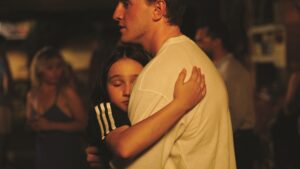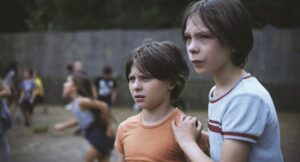Amid the hoopla of the Oscars and award season, a couple of moving, astonishing, and beautifully crafted features by first-time woman directors slid by without much fanfare. One reason for that might be that both are filmed from the point of view of young girls, even though as films they are thoroughly sophisticated and adult in their storytelling. Another is that they are essentially quiet movies that are not everything, everywhere, all at once.
First, there is Aftersun. Although it premiered at Cannes, screened at prestigious world festivals, and received glowing reviews and an Oscar nomination (for actor Paul Mescal), it was released — first theatrically last fall, then streaming this year — almost invisibly.

When you watch it, however, it’s impossible to ignore how radical this act of filmmaking is — so different, in fact, some viewers may become alienated and unwilling to meet its challenges. It’s not that Scottish director Charlotte Wells uses a brand-new or ostentatious technique. Aftersun is filmed in a hyperreal documentary style that has long been a staple of European art films and American independents, using handheld cameras and long takes.
Instead, it’s almost as if Wells has reinvented film narrative in the ways she chooses what to tell you and when, and especially the rigor with which she holds back.
The story is a memory piece, an extended flashback about the experiences of Sophie, an 11-year-old Scottish girl on holiday on the Turkish coast with her 30-year-old dad, played by Mescal. Sophie is also seen briefly in the present, 20 years later, when she’s a grown woman — the same age as her dad is in the flashback — with a wife and baby.
Young Sophie — played by the uncanny Frankie Corio — is filming her vacation with a camcorder, and some scenes play out as the footage she has shot. But mostly, Aftersun follows Sophie from arrival at the airport to departure, as she lolls away her days and nights with her father in a not-very-posh beach resort. She observes some older tourist kids pawing at each other, and she does a bit of innocent flirting herself with a British boy she meets at an arcade. But not every scene in the film involves Sophie, and the moments in which she’s not present are the invention of memory: attempts by her adult self to look back and understand what was going wrong with Calum, her father, in the time that they had together.
There’s no narration, no exposition. What you learn about Sophie and Calum is only what you witness on film. Most of the action unfolds chronologically, but there are jumps in time. You learn that Sophie’s parents are divorced, and that this trip is one of the rare times Sophie has with her dad, who doesn’t live in Scotland. He is apparently between jobs and financially constrained, and trying to conceal from his daughter some profound psychological issues that are expressed only in unclear yearnings and frustrations when acted out.
With this level of mystery, one must be grounded by the performances, and Corio and Mescal are so flawlessly real in their interplay and private moments that suspending one’s disbelief is beside the point. Both actors are equally masterful, so it’s a shame the Academy chose to nominate Mescal over Corio, especially when recalling such Oscar winners of the past as Anna Paquin in The Piano and Tatum O’Neal in Paper Moon.
Some may delight in speculating what the truth is behind the characters of Aftersun. But I believe there are no conclusive answers, only an understanding of the processes of memory and identity that the film lays bare so creatively.
Memory has nothing to do with Playground, a Belgian film by Laura Wandel that opened in early 2022 with even less promotion than Aftersun and is now available for streaming. Playground is about bullying in a Belgian grade school, and it remains insistently in the present and strictly limited to the eye-level point of view of its eight-year-old heroine, Nora.

Played with riveting verisimilitude by young Maya Vanderbeque, Nora has trepidations about going to school that her father tries to quell. Among other concerns, she’s worried about her sullen older brother Abel (Günter Duret), who is the object of taunts and abuse by his classmates. How this plays out is as urgent and powerful as Greek tragedy without the melodramatic violence and chorus of commentators.
Wandel is clearly a fan of the great Belgian filmmakers Jean-Pierre and Luc Dardenne, who perfected the technique of handheld, limited-point-of-view documentary shooting decades ago with such films as The Promise, The Son, and The Child. The Dardenne brothers, in nearly all their films, present characters in a state of deep moral crisis — a test of conscience.
But that’s where Wandel departs and finds her own marvelously distinct voice as a filmmaker. Nora is simply learning and adapting to the ways of her world, and the playground is the ultimate arena — indeed, the entirety of the film takes place at her school. She stumbles, suffers, and bitterly compromises, and watching her do this — with the camera sometimes fixated on her reactions to events rather than the events themselves — is terrifying and exhilarating, though the pace of scenes is never sped up or slowed down to heighten suspense.
The film’s insight into the kind of personal dramas that young children face is truly immense, and Wandel elicits miraculous performances from her child actors. The adults in the story, visible only when they bend down into the film’s line of sight, are simply guideposts to what ensues. Playground is an experience that any adult who was once a child can appreciate.



